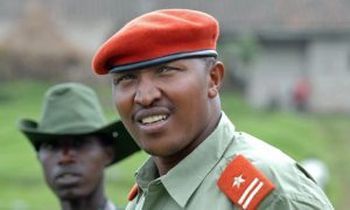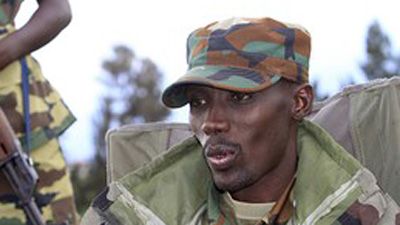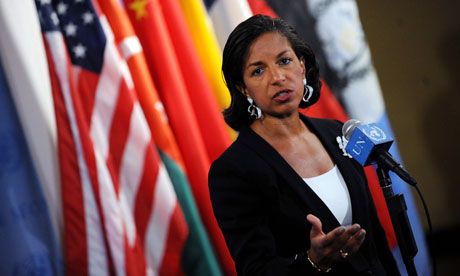
Publisher:
Bonnie King
CONTACT:
Newsroom@Salem-news.com
Advertising:
Adsales@Salem-news.com

~Truth~
~Justice~
~Peace~
TJP
Mar-31-2013 00:20

 TweetFollow @OregonNews
TweetFollow @OregonNews
Bosco Ntaganda's Surrender In Rwanda: What Must Be Different This Time In The Congo
Kambale Musavuli for Salem-News.comNtaganda's arrest will test the global community’s political will to help dismantle destabilizing networks in the eastern provinces of the DRC
 War crimes suspect Bosco Ntaganda |
(NEW YORK, NY) - On March 26, 2013, war crimes suspect Bosco Ntaganda appeared for preliminary proceedings before the International Criminal Court (ICC) as the judges set the date for the case “The Prosecutor v. Bosco Ntaganda” to begin September 23, 2013.
The ICC had taken him into custody on March 22 and escorted him to the ICC detention center in The Hague (Netherlands) after it was confirmed by both the Rwandan government and the US Department of State that the Rwandan native Bosco Ntaganda surrendered himself voluntarily to the US embassy in Kigali, Rwanda and asked to be sent to the ICC.
Of the twenty-one arrest warrants the ICC has issued to individuals, he is the first to surrender voluntarily for trial. Bosco Ntaganda has two ICC warrants (2006 & 2012) against him for war crimes and crimes against humanity, accused of child soldier use, murder, rape and sexual slavery; he is being charged on seven counts of war crimes and three counts of crimes against humanity by the ICC prosecutor.
Bosco Ntaganda is the third high-profile veteran of the Rwandan Patriotic Front (RPF) and Rwanda-backed militia leader in the eastern provinces of the Democratic Republic of Congo (DRC) to have fled to Rwanda after having committed heinous crimes in the Congo. Jules Mutebesi, formerly of the Rally for Congolese Democracy (RCD), did the same in 2004 while Laurent Nkunda continued the illicit Rwanda-backed network under the guise of the National Congress for the Defense of the People (CNDP) in 2006. In 2009, when global pressure built on Rwanda to cease its support of the CNDP and its leader Laurent Nkunda, Rwanda placed Laurent Nkunda under house arrest (he remains under house arrest in Rwanda) and replaced him with Bosco Ntaganda. Today, due to pressure, Bosco Ntaganda has been removed from the equation and Sultani Makenga now stands to take Bosco’s place presiding over the same Rwanda-backed illicit network that has been a fixture in the eastern provinces of the DRC for the past 15 years.
 Sultani Makenga photo courtesy: sabc.co.za |
It is vital for the global community to understand that Bosco Ntaganda neither acted alone nor as a “rebel” in the sense that many portray him, but as a Rwandan proxy. It has been a common political tactic, on Rwanda’s part, to install top military officials in the Congolese military. When Rwanda first invaded the DRC in 1996, for instance, it installed James Kabarebe as the Congolese Army Chief of staff. Kabarebe, who is currently Rwandan Minister of Defense, was named in the November 2012 UN Group of Experts Report as among the top level officials in the Rwandan government orchestrating and commanding the M23 militia in the DRC. He was also responsible for replacing Laurent Nkunda with Bosco Ntaganda as head of the CNDP in 2009.
Bosco Ntaganda has been transferred to the ICC and many wonder what secrets he will reveal. The fate of this individual and the content of his testimony during the trial may divert attention from the real question at hand: will the global community allow the Rwanda-backed illicit network in the eastern provinces of the DRC to remain intact? As clearly shown when Mutebesi and Nkunda were removed from the field, the military aggression in the region does not require Bosco Ntaganda to continue its operations. Moreover, both Bosco and Makenga took up arms against the Congolese people and Makenga is under U.S. and U.N. sanctions for the use of child soldiers and other crimes, reminding us that the issue is not Bosco alone, but the network and/or system that produces the likes of Bosco, Mutebesi, Nkunda, Makenga and a host of others. The DRC’s current president, Joseph Kabila, who lacks legitimacy, is complicit in preserving this network rather than laying the groundwork for peace and security in the country. He utilized the network to intimidate voters and appropriate the 2011 elections. Will he once again enter into a deal with yet another Rwanda-backed militia leader–Sultani Makenga–leaving the illicit network intact and operational?
 Susan Rice photo courtesy: guardian.co.uk |
Although there has been a recent increase in focus and attention on the region and the U.S. has acknowledged on several occasions the destructive role that its allies Rwanda and, to a lesser extent, Uganda have been playing in destabilizing the eastern provinces of the DRC, the administration has clearly hit the threshold of its willingness to hold these client states to account-a threshold that is too low to exert the pressure needed for significant change. The U.S. Ambassador to the UN, Susan Rice, effectively reinforced the Obama administration’s official stance when she recently stated that, while the U.S. recognizes that Rwanda has been “negatively involved” in the DRC, holding them accountable is “complicated.” Complexity is not a viable reason to continue “business-as-usual” when the result is widespread suffering. Rwanda and Uganda, both led by strongmen and lauded in the international community, have invaded the Congo twice and consistently sponsored militia groups inside the Congo resulting in the death of millions of Congolese civilians, and yet the political will of the United States and the global community to hold them accountable remains lamentably weak.
Congolese people are seeking peace and justice. Trying Bosco Ntaganda at the ICC may lead to some measure of justice for the crimes perpetrated at his behest; however, it appears that his backers in Rwanda may very well be let off the hook yet again and allowed to continue their military aggression against the DRC. While the drama has been unfolding in Rwanda, Paul Kagame has been on an image rehabilitation tour in the U.S., getting support from Harvard University, Coca-Cola, the World Bank, and long-time supporter and Civil Rights icon, Andrew Young. Former British Prime Minister, Tony Blair and Howard G. Buffet, son of multi-billioniare Warren Buffet, have been on a public relations offensive to cleanse Rwanda’s image of any association with criminal activity in the DRC.
Public propaganda and promotional appeals must not be allowed to cover for Rwanda’s destructive role in the region. Though support for Paul Kagame and the Rwandan regime exists at the highest levels of government and industry in the West, volumes of studies and reports from 1997 continuing to present day have established the verity of their longstanding aggression against the DRC. The responsibility of those working for peace in the region remains to acknowledge the body of evidence and to put pressure on Rwanda to cease its sponsorship, support, and backing of illicit networks in the DRC that have visited untold suffering upon the people of Congo. When searching for solutions, it is vital to examine recent history for ways to avoid feeding cycles of violence. The Congolese government must not integrate the Rwanda-backed M23 network into the Congolese military as it did in 2009, which laid the foundations of the current crisis, or we will face a similar problem in another few years.
Militia leaders who have fled to Rwanda after having committed war crimes and crimes against humanity in the DRC should face justice. Figures such as Laurent Nkunda Batware, Jean-Marie Runiga, Baudouin Ngaruye and Jules Mutebesi would be a good start. As a result of the UN-created Peace Framework for the DRC, former Irish Prime Minister, Mary Robinson was appointed as UN Special Envoy to the Great Lakes Region. As Special Envoy, Prime Minister Robinson can seize the opportunity to push for these other war criminals in Rwanda to face justice. This would send a signal to leaders in the region that the global community is finally serious about combating impunity and lack of accountability in the DRC.
Since President Obama’s 2009 Speech in Ghana, where he declared that the U.S. was ready to support “strong institutions” and not “strongmen” in Africa, many have been awaiting this much-needed shift in U.S. foreign policy. Unfortunately, the declaration rings hollow, especially to the nearly one million Congolese who have been displaced since Spring 2012, because, in spite of all the mayhem and suffering that Rwanda’s strongman, Paul Kagame has sponsored in the DRC, he continues to receive strong support and backing from Washington and a plethora of powerful institutions and individuals in the West. The arrest of Bosco Ntaganda should not be seen as a solution, but as a test of the global community’s political will to help dismantle the destabilizing networks in the eastern provinces of the DRC that produces the likes of Bosco Ntaganda.
Kambale Musavuli is the spokesman for the Friends of the Congo. He is featured in the short film “Crisis in the Congo: Uncovering the Truth,” an abbreviated version of the upcoming documentary looking at the role of Rwanda and Uganda in the upheaval in the DRC.
Submitted by: Jennifer Fierberg MSW Salem-News.com
 |
 |
 |
Articles for March 30, 2013 | Articles for March 31, 2013 | Articles for April 1, 2013

Quick Links
DINING
Willamette UniversityGoudy Commons Cafe
Dine on the Queen
Willamette Queen Sternwheeler
MUST SEE SALEM
Oregon Capitol ToursCapitol History Gateway
Willamette River Ride
Willamette Queen Sternwheeler
Historic Home Tours:
Deepwood Museum
The Bush House
Gaiety Hollow Garden
AUCTIONS - APPRAISALS
Auction Masters & AppraisalsCONSTRUCTION SERVICES
Roofing and ContractingSheridan, Ore.
ONLINE SHOPPING
Special Occasion DressesAdvertise with Salem-News
Contact:AdSales@Salem-News.com

Salem-News.com:
googlec507860f6901db00.html

Terms of Service | Privacy Policy
All comments and messages are approved by people and self promotional links or unacceptable comments are denied.
Gregory Malle March 31, 2013 4:57 am (Pacific time)
I always feel sorry for the audience of Kambale Musavuri and the likes of him who go out of there way to keep writing the same fallacies over and over with their own hidden agendas under the guise of human rights activism. Their is clearly a well funded propaganda machine against Rwanda, and I insist it is against Rwanda and not Kagame's government, because it would have still been the case if it were any other leader presiding over such miraculous progress in a country many had written off and expected to fail. Rwanda's progress is having a ripple effect in Africa and many countries are getting their governance acts together as a result. Unfortunately, progress in the "God forsaken continent" does not please all.
Kambale and the likes are doing a great disservice to the people of the great lakes region by creating the impression that Rwanda is responsible for the problems of DRC, and unfortunately this will lead to xenophobia against Rwandans and cause more war.
There are many reports already of Rwanda citizens that are getting killed in Belgium. Kambale and his mates are fanning hatred that could have severe consequences. Already it is almost an "accepted fact" that Rwanda has killed millions of DRC peoples, seriously we need more responsible journalism. Deaths from tribal conflicts, cholera, rapes and looting by congolese militia like mai mai are all attributed to Rwanda.
DRC has deep fundamental issues that need to be addressed, and unfortunately blaming Rwanda won't help, it is simply a misdiagnosis and consequently will result in no solutions.
DRC needs to take care of its citizens no matter what race or part of the country they come from. Eastern Congo is the poorest region in the World despite all its mineral wealth. The country's GDP is concentrated in little Kinshasa located on the western most tip of the country, and the people who live there careless what happens worlds away in the east.
It is hard to see real solutions visiting DRC any time soon, Until Congolese own their problems and accept their mistakes, instead of blaming other parties.
That is interesting since this POV is not from the mainstream, there are a handful of people exposing the Rwanda govt and Kagame for what they really represent. The truth is not a plot, it is just the truth
[Return to Top]©2025 Salem-News.com. All opinions expressed in this article are those of the author and do not necessarily reflect those of Salem-News.com.